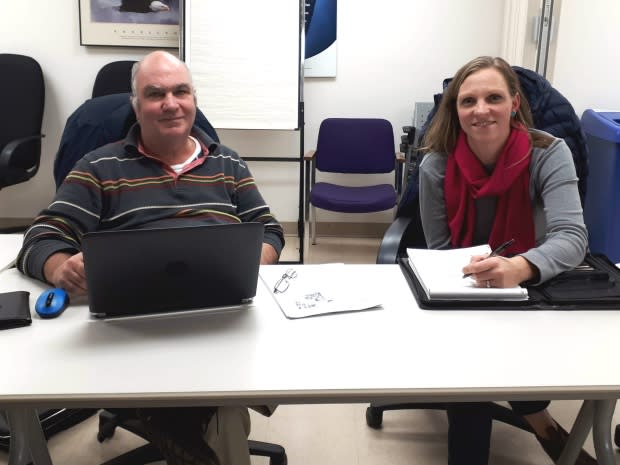As winter nears, some South Shore residents struggle to find warm shelter
There's a type of cold that most people never know, that digs deep into your bones when you've spent long winter days without heat, that makes you wonder if you'll ever be warm again — that's what some of Donna Crozier's clients deal with every day.
She's a housing support worker in Lunenburg and Queens counties on Nova Scotia's South Shore. Right now, she has six families living in cabins, RVs or other accommodations that aren't winterized.
"Places that are literally summer rentals or campers where they are not properly insulated and heated for our cold winters," she said. "I've seen people living in trailers that don't have running water and don't have power and are just making it work."
In the last 1½ years, Crozier has dealt with dozens of people in similar situations. She's even helped three or four people living in tents find homes, but she said there are many more who need help who just haven't come forward.
"It's very hidden in the rural communities because it's not that stereotypical person pushing a shopping cart or sleeping in a tent in the park … it's families that are struggling month to month to make it work because they are not in appropriate housing," she said.
Crozier said a lack of affordable housing in the area, the high cost of power and a slew of economic factors like job losses and costly medications can drive people to live in housing that is not safe.
"It breaks my heart," said Michael Graves, the co-ordinator of the United Way in Lunenburg County and a town councillor in Bridgewater.
Lack of emergency housing on the South Shore
The United Way organizes and funds programs and services that help people with low incomes.
Graves said there isn't much emergency housing on the South Shore.
"It certainly is a worry," he said.
Graves said his branch of the United Way only has about $120,000 to spend on initiatives.

"There's not much of a way for us to make a huge impact," he said.
The money is used to help teach people new skills, or pay for activities such as recreation passes to a gym or pool so families can take part in community events even if they can't afford it.
Graves estimates there are about 1,800 children living in poverty in Lunenburg County.
"That's more children than employees at Michelin and the hospital in Bridgewater, and those are two very large employers. That's a huge number," said Graves.

The province does have services to help people in need of housing. There are 11,500 public housing units across Nova Scotia and the province recently expanded its rent supplements program to help people more easily pay for a place to stay. There are also housing programs where the province has partnered with developers and not-for profit groups to build affordable housing.
There are about 3,500 households on the wait-list for public housing. The province expects to take 400 to 500 households off the wait-list for public housing this year.
Since 2015, the provincial government has reduced the wait-list for public housing by 25 per cent, according to Dan McDougall, the CEO of Housing Nova Scotia.
He said anyone needing a warm place to live should contact his office.
"If an inspection revealed an unsafe condition, then that would be one of the conditions considered for priority access," said McDougall. "Of course, we know there is always more that we can do, we're always looking for ways to maximize how many Nova Scotians we can take out of core housing needs."
Even so, it can still take months for Crozier and her housing support co-worker to find a place for someone to live.

In the short term, they try to get people to live with their extended family or cover the cost of a hotel, but money is tight and there is a limit to what they can do.
For two months, they even had to limit the number of people coming into the program because they simply couldn't keep up. There are currently 145 people getting help from the home support program.
Crozier said more affordable housing and perhaps a community fund that helps people pay for things like power would help keep her clients out of the cold.
She said one of her clients, who didn't have power or running water, was given a gift card for Tim Hortons.
"That person ... hadn't eaten in three days probably and took that gift card and just got a coffee and gave back the rest because they said someone else probably needed it more," said Crozier. "That's the type of people that we see."
